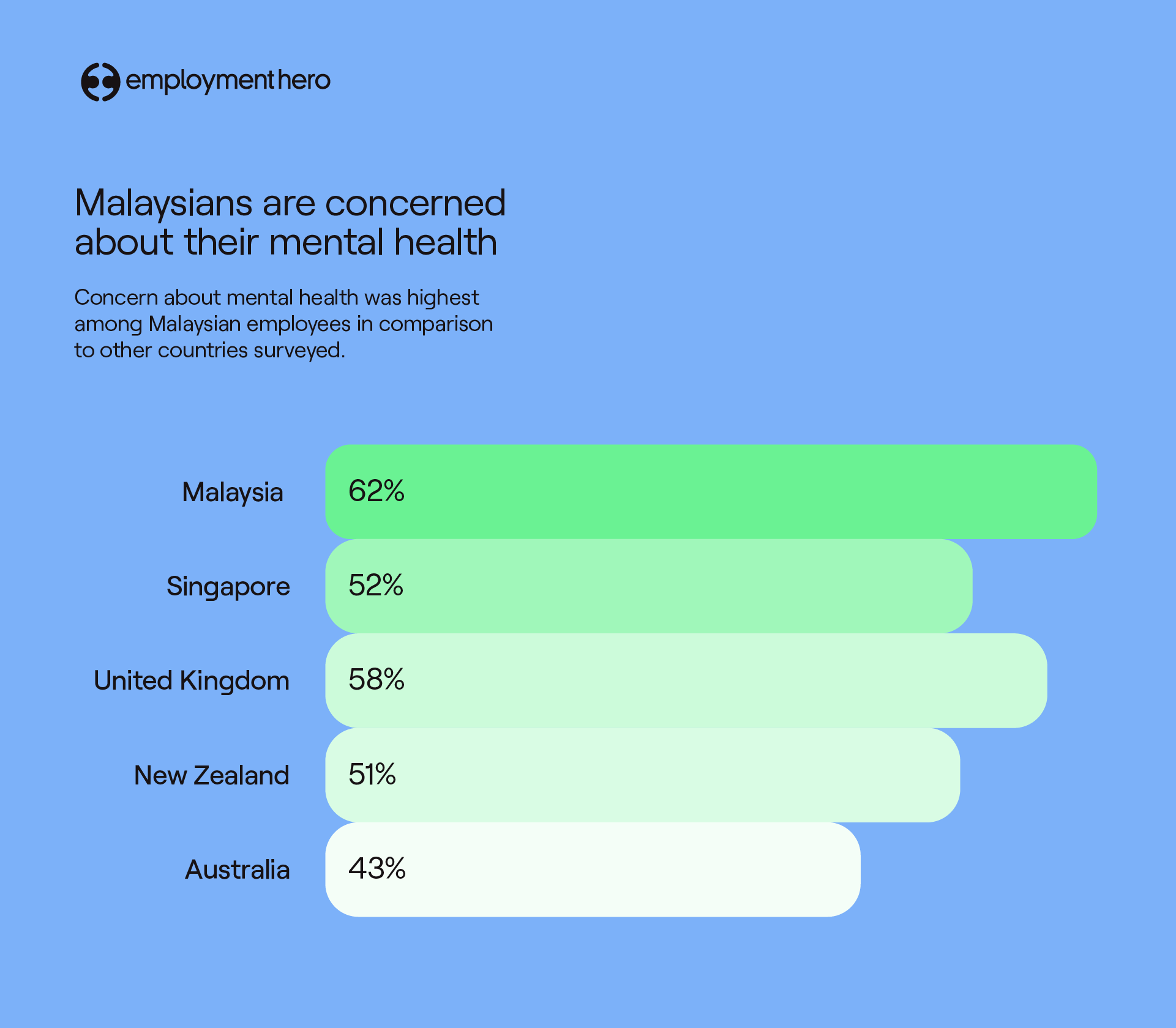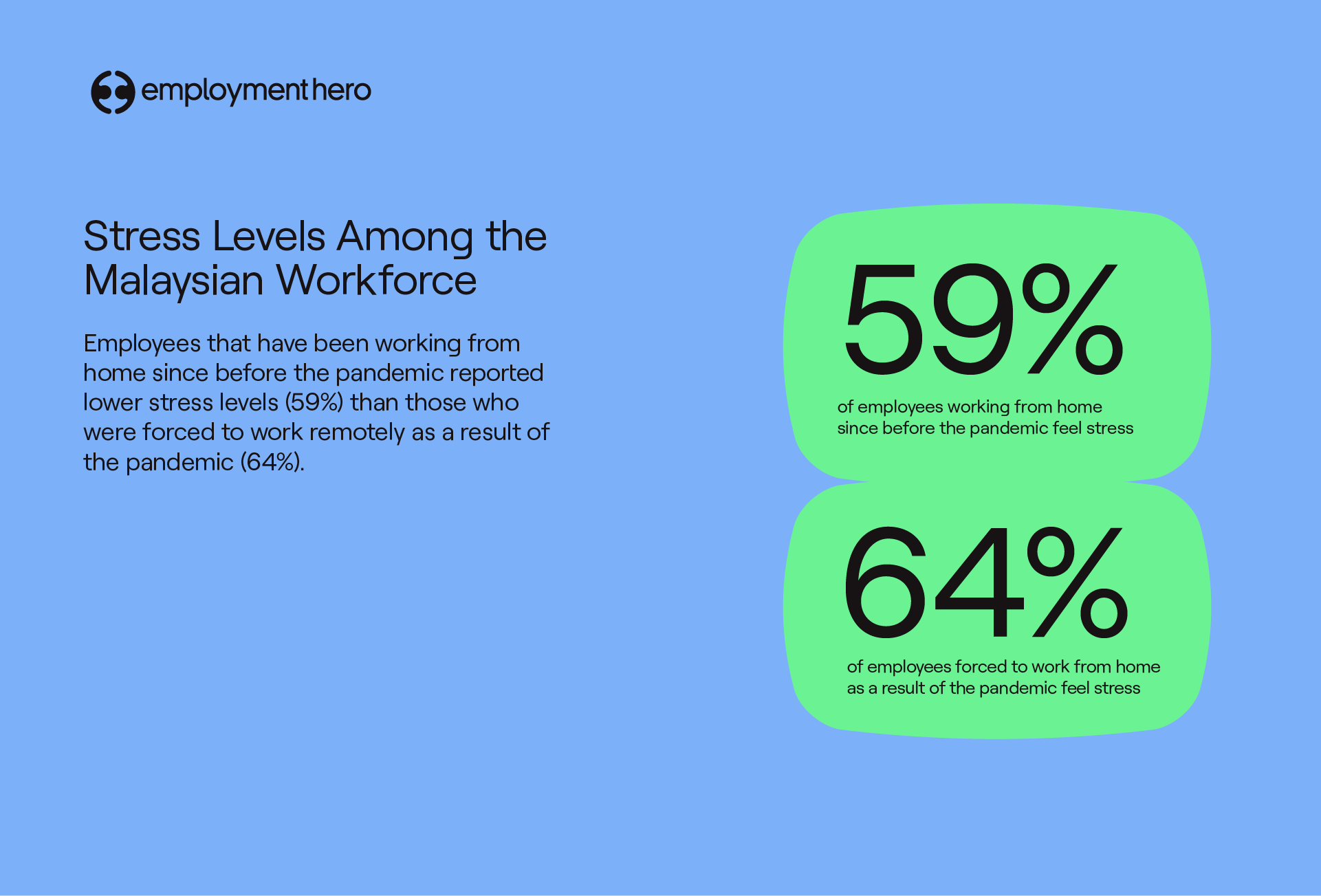Despite a fierce third wave of COVID-19, the Malaysian workforce is most worried about their financial well-being, a new study by Employment Hero, a payroll and benefits solution for small to medium-sized businesses, found.
Employment Hero’s 2021 global report on "The Impact of COVID-19 on Business Owners And Employees", based on an analysis of more than 1,000 Malaysian employers and employees, found that 71 per cent of Malaysian employees are more worried about their financial well-being than their physical (66 per cent) and mental (62 per cent) health.
Overall, more Malaysians (62 per cent) are concerned about their mental health compared to the workforce in other countries, with Singapore (50 per cent), United Kingdom (49 per cent, New Zealand (46 per cent) and Australia (46 per cent) showing lower levels of concerns.
The significant mismatch between rising demand for mental health support and what is currently offered by employers is hard to ignore.
Many employers believe that they are supportive of (74 per cent) of their employees’ mental health—but only 56 per cent of employees agree. On the topic of measurement, 59 per cent of employers said they have the tools to measure mental health issues at the workplace, but only 48 per cent of employees agreed.
When Malaysian employees were asked what employers could do to support their mental health, 70 per cent identified a healthy work-life balance as their preferred initiative, followed by company-provided counselling services (57 per cent) and increased health and wellness benefits (55 per cent).
The survey also found that fewer employees who’ve been working from home since before the pandemic reported being stressed (59 per cent) compared to the 64 per cent of employees who reported being stressed after being forced to work remotely as a result of the pandemic. This data emphasises the importance of well-managed communications and transitions to remote work by employers.
Employment Hero Chief Executive Officer and Co-founder Ben Thompson said companies that intend to continue working remotely or flexibly post-COVID will need to make work-life balance, mental health and overall employee wellness initiatives a priority in the organisation.
"Lack of clear structures, workflows and open communications across the organisation is adding unnecessary stress and strain on employees that are already struggling to cope with general pandemic-related anxiety,” he said.
“We can see that employees who were working remotely pre-pandemic are faring much better due to the right design and execution of remote working structures. With remote working still very much a necessity in this part of the world - and possibly the future - employers must take action and put the right guidelines and communications channels in place to ensure their employees’ well-being,” Thompson added.

Fortunately, looking ahead, 63 per cent of Malaysian employers stated that mental health will be a focus for their organisations in 2021.
Let's hope that more employers come to realise the importance of mental health and do the necessary.
Employment Hero’s 2021 global report on "The Impact of COVID-19 on Business Owners And Employees", based on an analysis of more than 1,000 Malaysian employers and employees, found that 71 per cent of Malaysian employees are more worried about their financial well-being than their physical (66 per cent) and mental (62 per cent) health.
Malaysians are more concerned about mental health than others

Overall, more Malaysians (62 per cent) are concerned about their mental health compared to the workforce in other countries, with Singapore (50 per cent), United Kingdom (49 per cent, New Zealand (46 per cent) and Australia (46 per cent) showing lower levels of concerns.
The significant mismatch between rising demand for mental health support and what is currently offered by employers is hard to ignore.
Many employers believe that they are supportive of (74 per cent) of their employees’ mental health—but only 56 per cent of employees agree. On the topic of measurement, 59 per cent of employers said they have the tools to measure mental health issues at the workplace, but only 48 per cent of employees agreed.
When Malaysian employees were asked what employers could do to support their mental health, 70 per cent identified a healthy work-life balance as their preferred initiative, followed by company-provided counselling services (57 per cent) and increased health and wellness benefits (55 per cent).
Better communication management needed

The survey also found that fewer employees who’ve been working from home since before the pandemic reported being stressed (59 per cent) compared to the 64 per cent of employees who reported being stressed after being forced to work remotely as a result of the pandemic. This data emphasises the importance of well-managed communications and transitions to remote work by employers.
Employment Hero Chief Executive Officer and Co-founder Ben Thompson said companies that intend to continue working remotely or flexibly post-COVID will need to make work-life balance, mental health and overall employee wellness initiatives a priority in the organisation.
"Lack of clear structures, workflows and open communications across the organisation is adding unnecessary stress and strain on employees that are already struggling to cope with general pandemic-related anxiety,” he said.
“We can see that employees who were working remotely pre-pandemic are faring much better due to the right design and execution of remote working structures. With remote working still very much a necessity in this part of the world - and possibly the future - employers must take action and put the right guidelines and communications channels in place to ensure their employees’ well-being,” Thompson added.

Fortunately, looking ahead, 63 per cent of Malaysian employers stated that mental health will be a focus for their organisations in 2021.
Let's hope that more employers come to realise the importance of mental health and do the necessary.





